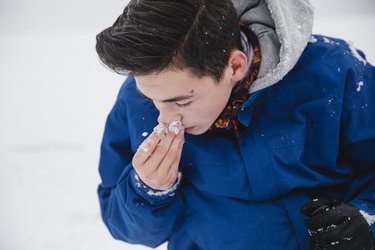
Getting an occasional nosebleed while exercising may cut your workout short, but it's generally not something that should cause you to shelve your exercise program entirely. Instead, finding ways to manage any health conditions and keep your sinuses from getting too dry should help keep nosebleeds away.
Dealing with a bloody nose while running, lifting weights or doing downward dog in yoga class can be a bit distracting and definitely messy. And while getting a nosebleed while working out may cause you to worry, there are several normal reasons why this may happen.
Video of the Day
Video of the Day
"The most common reason for nosebleeds, or epistaxis, while exercising is dry nasal passages, which is especially common during winter months where the air is driest," says Seth Larsen, DO, a board-certified family physician, and a doctor at SteadyMD, an online primary care service.
He also says it can be an issue at other times of the year, depending on your location and climate. "Things like seasonal allergies and sinusitis will predispose people to nosebleeds, as they make the nasal passages more fragile due to inflammation."
Unique circumstances of your workout can also trigger them, such as exercising in an air-conditioned facility or in front of a fan.
Your exercise intensity could be to blame, too. "When we exercise hard, our heart pumps blood faster, causing an increase in blood pressure and heart rate," says David Nazarian, MD, a primary care physician and founder of My Concierge MD in Los Angeles. "As a result, our blood vessels widen and can sometimes cause the small capillaries in the nose to break open, causing a nosebleed."
This is more common in certain conditions, such as dry weather or when you're dehydrated, says Dr. Nazarian, or if you have underlying health conditions, such as high blood pressure or bleeding disorders, or if you're taking medications that cause blood thinning.
If you're dehydrated, Dr. Nazarian says, you may experience dryness of the membranes, including the nasal membranes, which can cause a nosebleed while working out. To help prevent this, drink plenty of fluids before, during and after exercise.
Nosebleeds May Be a Sign of an Underlying Health Condition
If you're frequently getting nosebleeds while working out, after exercise or in general, it might be time to talk to your doctor. It's rare, but nosebleeds could be a sign of something more serious, according to the Cleveland Clinic.
One condition, hereditary hemorrhagic telangiectasia (HHT), while rare, causes nosebleeds to worsen over time. In HHT, abnormal blood vessels could lead to a lung or brain bleed.
Dr. Larsen says other serious conditions, such as unmanaged hypertension or blood clotting disorders, can also cause frequent nosebleeds.
How to Manage Nosebleeds
Here's how to manage the symptoms of a nosebleed after exercise or while working out, according to the American Academy of Family Physicians:
- Sit down and lean slightly forward. This can help prevent the blood from going down your throat.
- Squeeze the soft portion of your nose together using your thumb and index finger.
- Hold this position until the bleeding stops. Be patient, because this may take a few minutes — and sometimes as long as 5 to 10. Try doing this a few times if necessary.
Tip
If the bleeding hasn’t stopped after 20 minutes, seek medical help.
How to Prevent Nosebleeds
When it comes to preventing a bloody nose, Dr. Larsen says the best thing to do is to manage your nasal health outside of exercise. "If you have seasonal allergies or are prone to nosebleeds, daily or even more frequently, nasal saline rinses can be helpful," he says.
Additionally, he recommends sleeping with your ceiling fan off. "When on, it will dry out the nasal passages overnight and make you more at risk for having a bleed the following day while exercising," he says. Along those same lines, avoid training directly in front of a fan. If you tend to overheat when exercising, wear lighter, sweat-wicking clothes.
Is this an emergency? If you are experiencing serious medical symptoms, please see the National Library of Medicine’s list of signs you need emergency medical attention or call 911.